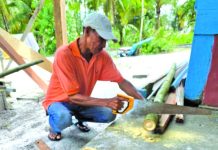Can this situation become a reality within the next three years? Can an almost cashless system be achieved in Guyana? Is Guyana ready for digital payments using our mobile phone?
The answer to all these questions is YES, YES and YES. The technology is now readily available in many countries where our mobile phones can now be our banks and our wallets which can enable consumers to do just about everything. In most societies, cash has literally died. I cannot remember the day when my wallet has more than US$50 in it and that is mainly because of an old custom that I adhere called “vex money”, which is emergency money just to get home if you need to exit in a haste. I can do everything with my phone and my cards and cannot remember when last I touched cash, but yet conduct my daily life smoothly and seamlessly. I can meet all my financial obligations on time and yet I do not touch cash.
Cash in Guyana must die simply because of the fact that the country has too much cash in circulation. With 58 per cent of its economy conducted in cash, such a situation continues to breed a tremendous amount of corruption, crime, and a vibrant underground economy. So when Clive Thomas speak such high nonsense about “Guyana was losing G$300 billion per year under the [People’s Progressive Party] PPP”, it Is clear that he is having serious issues upstairs. Only one with serious spates of insincerity will think that today in 2017 that the underground economy in Guyana is not alive and kicking. In this Government in which Clive Thomas is serving a massive role, we have rampant procurement fraud – the State Assets Recovery Unit (SARU) should check out the D’Urban Park Ponzi Scheme Project – a runaway illicit capital flight (which is worst today than it was under the PPP) and a growing underground economy. Actually if one studies the system of national accounts in Guyana over 2016 and the corresponding monetary data coming out of the Central Bank, it is clear that the underground economy has taken off to the point it a clear and present danger to the formal economy.
Therefore, rather than engage in all of these words of deception and fear mongering, what the “Robert Clives of Guyana” should be doing is encouraging their bosses to go digital on all front. No more check from the Finance Ministry but direct wire transfer into the bank accounts of payees including contractors. Plus there should be a tax advantage if you use card or wire transfers as the prefer method of payments. What such a public policy does is cause a greater amount of financial transactions to be recorded.
Guyana has many different opportunities to exploit going digital. First and foremost, we have to develop the unified payment interface that connects all the banks and the major consumers of cash in a cost effective manner. This entire platform has to be supported by the mobile phone so that once someone has Wi-Fi, then they can execute payments or transfer money from your account to any other account including to any merchant who has a bank account, in a very cost effective manner and in the flash of a second.
Secondly, those we do not have a smartphone or the Internet, there is the GSM phone, you have a system called USSD (Unstructured Supplementary Service Data). The USSD system uses a text-driven system to communicate with your bank to provide payment services.
Thirdly, as was developed in India, there is a low technology system called AEPS (AADAR Enable Payment System) using people fingerprints and a specific identifier number, which is presented, at a central location in the respective villages. Why is this system good for Guyana? This system specifically targeting the elderly and the very poor and those who do not understand phone technology. All they have to do is present the name of their bank and their AADAR number at the grocery shop or any store and the store attendant will ask them to press their fingerprint onto the machine. Behind the scene, this fingerprint is stitched to a bank account and their requested payment is executed instantaneously with a balance on their pension account printed out automatically.
To achieve a cashless society, there needs to be a change of mindset and leadership. Can we do it? Yes, we can!











